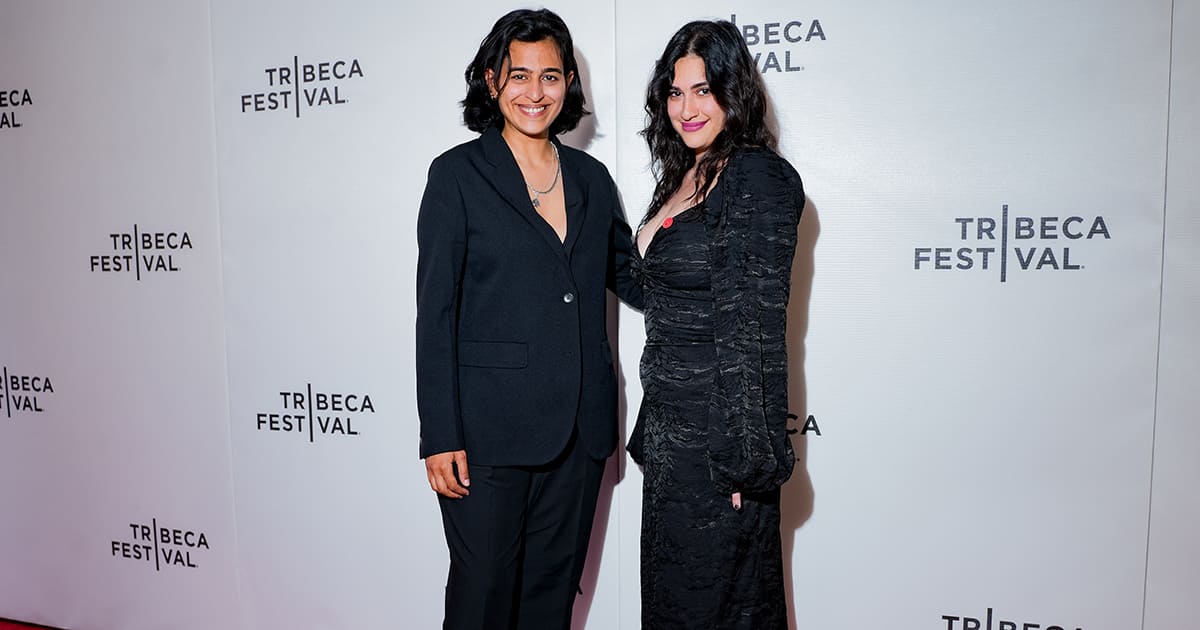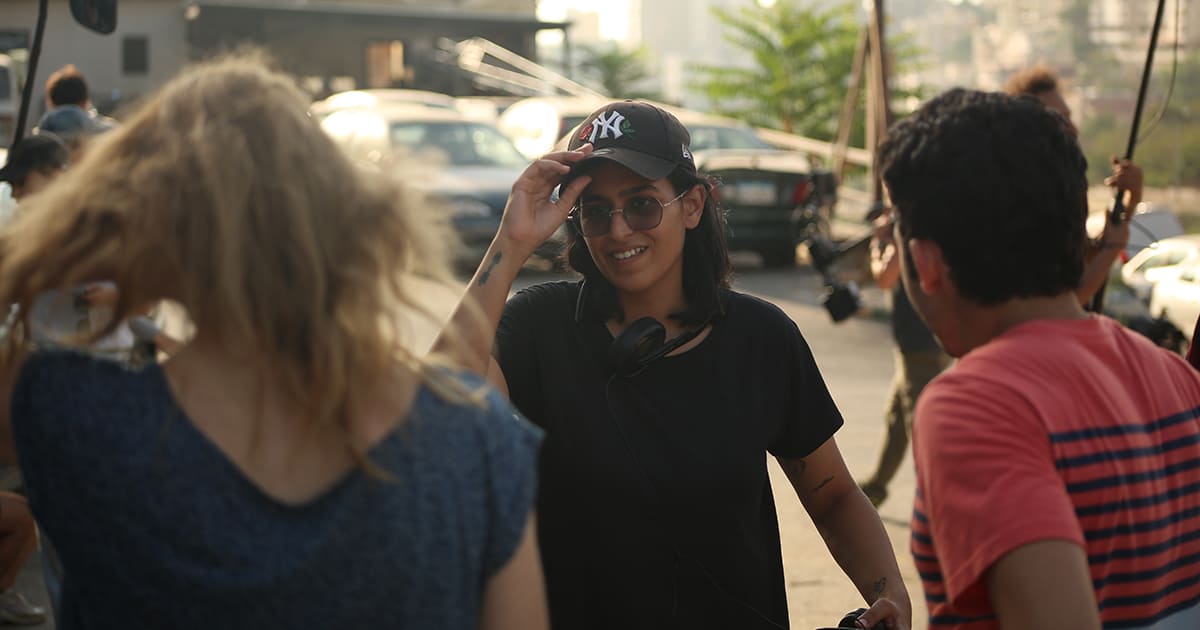LAU Alumnae Take Lebanon’s Cedar to the Global Screen
Mira Shaib and Zeina Badran talk about the making of Arzé and the significance of sharing Lebanese stories on the global stage.
Following a special screening of Arzé, Lebanon’s official entry for the 2024 Oscars, on January 23 at the Beirut campus, we had the privilege of sitting down with director Mira Shaib (BA ’15) and producer Zeina Badran (BA ’15)—both proud LAU alumnae who studied communication arts with television and film emphasis—to discuss their experience in bringing this powerful feature drama to life.
The feature film tells the story of a single mother striving to achieve her modest dream in modern-day Beirut despite the overlapping political, societal, and economic challenges. Since its North American premiere at the 2024 Tribeca Film Festival, Arzé has captivated audiences worldwide, earning critical acclaim and prestigious awards, including Best Actress for Diamand Abou Abboud and Best Writing for Faissal Sam Shaib and Louay Khraish at the Cairo International Film Festival.
Shooting a feature film in just 24 days, and on a tight budget, sounds intense. What was that experience like, and what were the biggest challenges you faced?
Zeina Badran: It was a unique experience in my film career. It meant we had to be extremely organized and make the most of every minute on set. There was no time for mistakes or reshoots, so preparation was key. One of the biggest challenges was working with 21 different locations in just 24 days. We shot in real locations, with real people and environments as they were, which made every location unique and unpredictable. Many of these places were busy, chaotic, and not controlled sets, so we had to adapt constantly. On top of that, we often had to explain to people what a film shoot involved and how they could help us by giving us space or keeping noise levels down. This took a lot of patience and communication, especially when we were already working under serious time pressure.
Despite these challenges, the experience taught me a lot about problem-solving, teamwork, and making quick decisions under pressure. It also showed me that limitations can push creativity in unexpected ways. In the end, the intensity of the process made finishing the film even more rewarding.
In one interview, Mira describes Arzé as a “community movie.” Could you elaborate on what that means and how it distinguishes the film from traditional approaches to directing?
Mira Shaib: When I call Arzé a “community movie,” I mean that we all worked on it together like a family.
I was learning every single day, just like everyone else. As much as I was guiding the film, the process was also shaping me. We learned from each other—about filmmaking, about Beirut, about resilience. That’s what makes Arzé special. It’s not just a film; it’s a reflection of all of us, created with love, trust, and a deep connection to the city and its people.
From casting to storytelling, the film involved people who were deeply connected with Beirut and its struggles. It wasn’t just about directing actors but about creating an environment where real stories, emotions, and perspectives could shape the film organically. That approach gives Arzé an authenticity that’s hard to achieve in more conventional filmmaking.
What inspired you to tackle the recurring theme of sectarianism in Lebanese society with humor in the movie?
Mira Shaib: Sectarianism in Lebanon is a heavy, exhausting reality—it’s everywhere, shaping politics, daily life, even personal relationships. But rather than approaching it with anger or tragedy, I wanted to use humor as a way to break through the tension. Sometimes, laughter is the only way to process things that feel too big or too frustrating to change.
Humor also allows people to engage without feeling defensive. When you make someone laugh, they let their guard down, and that’s when they start to really see things differently. In Arzé, the comedy isn’t about making light of the issue but about exposing its absurdity. By playing with irony and exaggeration, I wanted to show just how deeply sectarianism is ingrained in our society—so much so that, when you really step back, it almost feels ridiculous.
Beyond being “an ode to Beirut and all mothers,” is there another message or theme you hoped to convey through Arzé?
Zeina Badran: Beyond being “an ode to Beirut and all mothers,” Arzé also explores the deep and complex bond between a mother and her son, as well as the broader theme of family ties in Lebanon. We wanted to highlight the unspoken emotions, sacrifices, and struggles that shape these relationships, especially in a society where family plays such a central role.
At the same time, the film delves into the idea of working toward what you want and the tension between dreams and reality. It reflects on the challenges of pursuing one’s aspirations in a place where circumstances often make it difficult to do so.
Have you always been passionate about filmmaking? And what led you to choose Television and Film as your major?
Zeina Badran: Since I was very young, I knew I wanted to tell stories, but I didn’t know how. I was always drawn to storytelling in different forms, but it wasn’t until I grew older that I started gravitating toward filmmaking. The more I explored it, the more I realized that cinema was the medium that felt most natural to me; it allowed me to bring stories to life in a way that resonated deeply. So, when it came to choosing a major, going into Radio/TV/Film was an obvious choice. It gave me the tools to shape narratives visually and the space to develop my voice as a filmmaker.
Is there a particular incident, discussion, or event that left a lasting impression on you during your time at LAU?
Zeina Badran: It’s not a specific incident but rather the whole experience at LAU that still resonates with me. The people I met, the professors who guided me, and the projects I worked on all played a huge role in shaping my path. Being surrounded by creative, passionate individuals pushed me to challenge myself and refine my voice as a storyteller. The collaborative nature of the program and the opportunities I had to experiment with filmmaking were key contributors to where I am now in my career.
Since you graduated from LAU in the same year as Mira, did your time at university overlap in ways that shaped your collaboration and shared vision behind Arzé?
Zeina Badran: Although Mira and I collaborated on some projects at LAU, we actually grew closer and started working together more after graduating. However, during our time at LAU, we recognized and respected each other’s passion for filmmaking. There was a mutual understanding that we were both dedicated to this path, and I think that acknowledging this at an early stage created a foundation for our future collaboration. It’s been great to see our journeys evolve, and even more rewarding to be able to share this experience now.
What projects are you currently working on or planning for the future?
Zeina Badran: I’m currently working on developing new feature films with up-and-coming directors. These projects are really exciting because they explore the true nature of who we are, tackling fresh and important topics that I believe will resonate with audiences. I’m thrilled about what’s coming up, and I hope people will get the chance to watch them soon.
This article has been edited and condensed for the sake of clarity.

